A year into new stormwater requirements for single-family home projects, homebuilders and remodelers say even the improved process is laborious and expensive, costing homeowners extra money.
On the other hand, Arlington County says that permit review times have shortened and that the program will be evaluated for possible improvements.
Before September 2021, builders had to demonstrate that a given property had ways to reduce pollution in stormwater runoff to comply with state regulations aimed at cleaning up the Chesapeake Bay.
Last year, the county began requiring projects that disturb at least 2,500 square feet of land to demonstrate the redeveloped property can retain at least 3 inches of stormwater during flash flooding events through features such as tanks, planters and permeable paver driveways. Builders must also refurbish the soil with soils that increase water retention.
Arlington Dept. of Environmental Services spokesman Peter Golkin says improvements like these “are vital as we continue the work toward a flood resilient Arlington,” especially as “the pace of single family home construction in Arlington remains strong.”
But the regulations are fairly new and could change, Golkin said.
“The first projects in LDA 2.0 are now coming to construction, and the County is entering the phase of evaluation to identify potential adjustments and improvements,” he said. ”The County expects to have more information about any LDA 2.0 updates by mid-2023.”
The updates were intended to address increasing infill development and rainfall intensity, and the downstream effects of runoff and impacts to the county’s aging storm drains and local streams.
Builders and remodelers say the changes have caused new headaches and resulted in projects shrinking in size.
“It only gets more complicated, costs more, and takes longer,” says architect Trip DeFalco.
Andrew Moore, president of Arlington Designer Homes, said he’s avoided this process in many projects after telling the clients about the potential costs and permitting time.
“People are motivated to think, do I need that bump-out to be 14 feet? I can live with 12 feet,” he said. “It saves you $50,000 and 3 months.”
Despite the hassle, permit applications are still coming in at a clip of, on average, 20 per month.
Responding to redevelopment
In the wake of the destructive July 2019 flash flood, residents has discussed and voted on ways to address stormwater mitigation in Arlington, while the county has put more funding toward stormwater improvement projects.
The issue of runoff has figured into debates about how to protect streams and the impacts of allowing the construction of two- to eight-unit “Missing Middle” houses in Arlington, though such projects could only occupy the footprint currently allowed for single-family homes on a given property.
In the wake of the flash flooding, the county introduced new regulations for what it says is one of the biggest runoff contributors: new single-family homes.
“Ensuring more robust control of runoff from new single family homes, which create the majority of new impervious area from regulated development activity, remains a top County priority as part of the comprehensive Flood Resilient Arlington initiative,” Golkin said.
An average of 167 single-family homes have been built and an average of 155 torn down annually over the last 11 years, according to Arlington’s development tracker tool. Demolitions peaked in 2015 and completed projects in 2016.
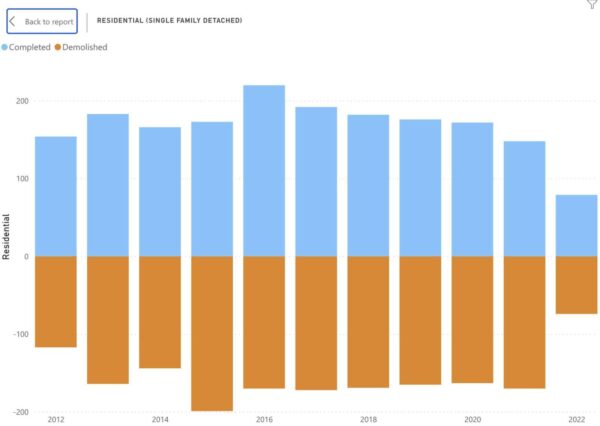
A past of pollution
DeFalco, who spent a few years as a builder, too, says the “county’s hands are a little bit tied” on this issue because they have to meet state requirements aimed at curbing pollution in the Chesapeake Bay.
Runoff brought fertilizer into the bay, causing algae and plants to grow quickly and then die, sink to the bottom, where they decayed and used up oxygen, says civil engineer Roger Bohr.
“The state is pushing on the county and the federal government is pushing on the state,” DeFalco said. “But the implementation on the homeowner level is pretty onerous… I don’t think the residents have any idea what’s going in their side yards.”
Golkin compared the transition period right now to when new state stormwater management requirements took effect in 2014.
“Staff and the building and engineering community ultimately came up to speed,” he said.
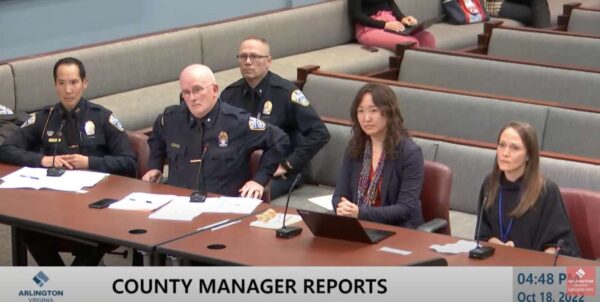
Arlington County Board members have indicated their impatience for traffic changes at an intersection where a woman was fatally struck by a driver two weeks ago.
During a meeting yesterday (Tuesday), Board members received a briefing from team members from Vision Zero — the county’s initiative to eliminate traffic fatalities and serious injuries — about all the work they do after a critical crash.
But Board members were less interested in the process and dwelled more on getting answers to questions like “How long will this take?” and “What can we do now?” Part of that motivation, according to Board Chair Katie Cristol, was that the death of 85-year-old Gwendolyn Hayes felt preventable.
“Any fatal crash is unacceptable to our community, as I know you feel deeply, as do we. And what feels so difficult about Ms. Hayes’ death is the sense that this is one that should have been prevented, especially because of those who had been killed at the same location before her,” she said.
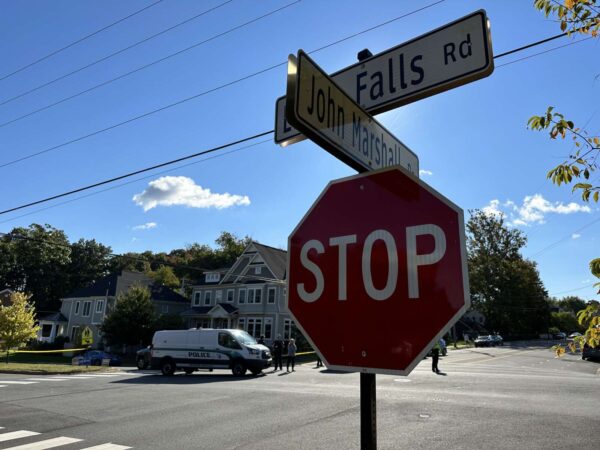
This was the second pedestrian death and the third notable crash in recent months, and the rash has prompted residents to demand more action. Viviana Oxlaj Pérez died in early August after being struck by an alleged drunk driver on 2nd Street S. and Old Glebe Road. A man charged with involuntary manslaughter related to her death has hearings set for February 2023, according to court records.
Shortly after, a child on a bicycle who allegedly pedaled into oncoming traffic was struck at the intersection of 3rd Street S. and S. Carlin Springs Road. Then, Hayes died at the intersection of Little Falls Road and John Marshall Drive.
All three crashes were near schools: Thomas Jefferson Middle School, Kenmore Middle School and Nottingham Elementary School, respectively. And while school zones are slated to get speed cameras, possibly later next year, it won’t help safety at the intersection where Hayes died, which is just outside the school zone boundaries.
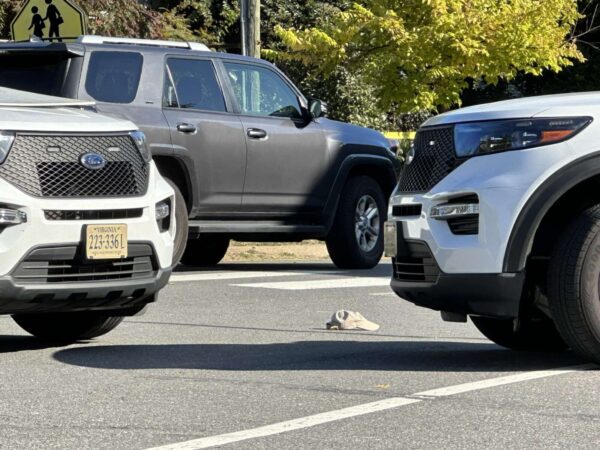
In light of these crashes, Board members pressed staff to give timeframes for the police investigation into Hayes’ and Oxlaj Pérez’s deaths. They asked when police will choose a vendor for speed cameras, and asked if more red light cameras could be installed. They urged staff not to let new research into this intersection slow them down.
“We’ve got a lot of data, we’ve got a lot of information that doesn’t require a lot of time to initiate original research and study,” Board Vice-Chair Christian Dorsey said. “I would encourage us to use the data that we have and the analytical framework and tools we have to work as expeditiously as we can.”
County Board member Matt de Ferranti said he visited with a neighbor near Little Falls Road who always has first aid supplies ready to take care of people who get into crashes. There have been a total of three fatal pedestrian crashes along a two-block stretch of Little Falls Road near Nottingham Elementary School over the past eight years.
De Ferranti said he has seen videos showing how hazardous the conditions are. These are examples of “qualitative data” staff should use to prioritize changes to this intersection, he said.
“I really hope we can be thinking in weeks and not months in terms of additional action,” he said.
Staff at Arlington’s Dept. of Environmental Services, which builds and maintains local roads, say they’re working on preliminary designs for safety improvements, but are waiting for the facts of the police investigation to finalize these designs.
“We are prioritizing this [intersection],” Transportation and Operations Bureau Chief Hui Wang said. “We are trying to see if there are other data we can utilize without the fresh collection.”
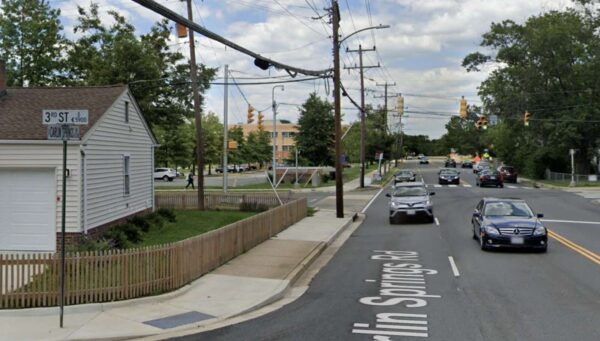
After a driver collided with a child on a bicycle on S. Carlin Springs Road this week, neighbors and advocates are calling for street safety upgrades.
For its part, Arlington County says it has already been working on safety measures for the area, which has narrow sidewalks, little or no pedestrian buffer and a history of crashes. Upcoming steps include reducing speeds near the schools in the area: Kenmore Middle School and Carlin Springs Elementary.
“We are looking into the details from police regarding the crash and will identify next steps based on the report,” Dept. of Environmental Services spokeswoman Katie O’Brien said.
And Arlington County Board member Matt de Ferranti has recently gotten involved, too. He tells ARLnow he has walked the area with advocates and will be meeting with staff next week.
“First and foremost, I understand that the young man is okay and the safety of our kids and our residents is highest on my mind,” de Ferranti said. “Second, the accident raises important and urgent questions about safety in that whole corridor… We need to do better to address them.”
How the crash happened
Just before 7 p.m. on Monday, a driver traveling south on S. Carlin Springs Road proceeded through a green light and struck a juvenile riding a bicycle in the crosswalk, Arlington County Police Department spokeswoman Ashley Savage said.
The driver remained on scene. The child, who did not require a trip to the hospital for treatment, was tended to on scene by medics, Savage said. No citations were issued.
While ACPD does not provide identifying information, she did say the child involved was older than first reported on social media.
The boy was bleeding, but injuries appeared NLT. He was tended to by medics and police in the back of what appeared to be an @APSVirginia white van (logo on pass door – assuming Kenmore M.S. related) to in the 7-11 parking lot. pic.twitter.com/qtr4Yijzrn
— Matthew Young (@matthewyoung31) October 3, 2022
A history of unsafe sidewalks
Community advocate Janeth Valenzuela tells ARLnow that she passed by the crash around 6:45 p.m. and saw emergency responders. She says she’s been working on safety along S. Carlin Springs Road for many years now, and has suggested everything from building a bridge for kids crossing the road to erecting a fence to prevent kids from getting pushed into the street.
“I’ve been proposing a lot of things, but they don’t take it into consideration,” she said. “The solution is hard.”
S. Carlin Springs Road is an important walking route for Kenmore students, but she and other residents say the pedestrian amenities are poor. Sidewalks are narrow and not well maintained and often do not have any landscaping separating pedestrians from traffic.
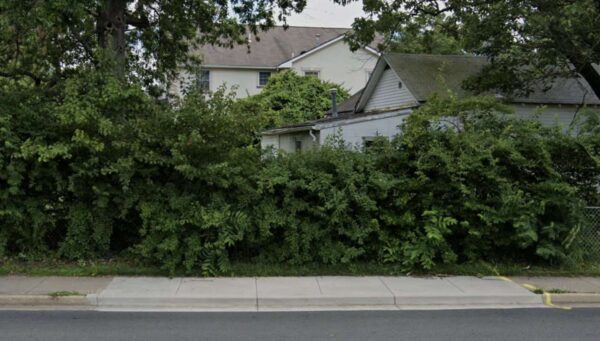
And people have been telling the county the same thing for nearly a decade, according to a 2014 report by the APS Multimodal Transportation and Student Safety Committee and Advisory Committee on Transportation Choices meeting minutes from 2017.
During one ACTC meeting in 2017, a father said moms with strollers pass kids playfully shoving each other on the sidewalk as cars whiz right next to them. In the winter, if the sidewalks aren’t plowed, kids walk in the road, he added.
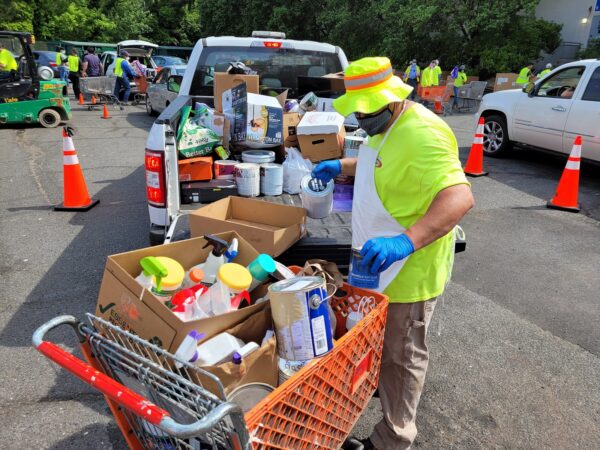
The Arlington Environmental Collection and Recycling Event (E-CARE) is back this weekend, providing residents the chance to get rid of unwanted paint, pesticides, and printer ink lying around the house.
The biannual E-CARE’s fall rendition is set to take place this Saturday (Oct. 8) at Wakefield High School from 8 a.m. to 3 p.m. Arlington residents will be able to drop off for safe disposal a host of household hazardous materials, outdated electronics (including old-school cathode ray televisions), and items containing mercury.
However, small metal items and bikes will not be accepted this time around in order to “streamline traffic flow.”
Saturday, Oct. 8: Fall E-CARE at Wakefield HS. Gather up the old household goop and gadgets for convenient, safe drop-off. https://t.co/cBmpLnf0sE pic.twitter.com/vNUvfRTsl9
— Arlington Department of Environmental Services (@ArlingtonDES) September 29, 2022
Below is the list of accepted items:
- Automotive fluids
- Batteries
- Car care products
- Compact fluorescent light bulbs (CFLs)
- Corrosives (acids/caustics)
- Fire extinguishers
- Flammable solvents
- Fluorescent tubes
- Fuels/petroleum products
- Household cleaners
- Lawn and garden chemicals
- Mercury
- Paint products (25-can limit)
- Photographic chemicals
- Poisons (pesticides)
- Printer ink/toner cartridges
- Propane gas cylinders (small hand-held or larger)
- Swimming pool chemicals
Electronics like computers, printers, keyboards, scanners, copiers, cellphones, and televisions can also be dropped off, though those can also be picked up curbside with an online request.
Old-school tube televisions and computer monitors containing a cathode ray will be accepted but come with a $15 or $20 fee.
Items containing mercury like thermostats, thermometers, and barometers will be collected as well.
Things that will not be accepted include:
- Asbestos
- Explosives and ammunition
- Freon
- Medical wastes
- Prescription medications
- Radioactive materials
- Smoke detectors
This will be the first time this event is being held at Wakefield. The county is asking residents to enter via S. Columbus Street at George Mason Drive and drive around the school to the E-CARE site on S. Dinwiddie Street.
The county provided a few other tips including reminding locals that the event is only open to county residents so bring identification or a utility bill and pack cars in reverse order of drop off with electronics going in first and hazardous materials after.
The last E-CARE was held in April at Yorktown High School. At the two events in 2021, a combined 170,000 pounds of household hazardous materials were collected.
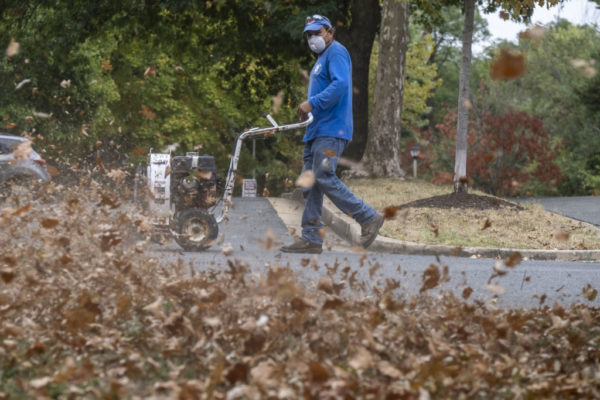
Cool fall mornings mean leaf collection season is near.
And Arlington’s Department of Environmental Services is reminding homeowners collecting their leaves and cleaning out their gardens to use only paper yard waste bags.
“Plastic ones can’t be composted and won’t be collected. If you have a landscaper, make sure they know,” spokesman Peter Golkin said. “The issue with yard waste in plastic bags is the most glaring problem for organics.”
Leaves bagged in paper can be composted along with other yard waste and food scraps, and turned into compost residents can use in their gardens.
Since September 2021, Arlington County has collected residents’ food scraps mixed in with their yard waste. Participation hovers around 40-45% of homes, and the county says participating residents diverted 27% of their food waste from the incinerator in April 2022, up from 21% in January 2022 and 15% in October 2021.
“As with any new program, there is a learning curve. Arlington is one of the first localities to collect food scraps at the curb,” Golkin said. “Food scraps collection is just over a year old but we hear from new users and even won a 2022 Achievement Award from the Virginia Association of Counties.”
He reported that there is demand for learning more about the organics collection process.
“We had a big turnout for the Rock-n-Recycle Solid Waste Bureau open house this month and got to share loads of information and compostable bags for food scraps, particularly with young families,” he said. “Same for the County Fair. More educational opportunities to come.”
The department will soon distribute a cart hanger with a rundown of what can, and can’t, be put in the cart.
Golkin has two rules of thumb: “If it grows, it goes” and “When in doubt, leave it out.”
Also under "YES": Hair, finger nails. Really. If it grows, it goes.https://t.co/9ps4JXzZET pic.twitter.com/h60FluVKRk
— Arlington Department of Environmental Services (@ArlingtonDES) September 22, 2022
So go ahead and put hairs from the hairbrush or fingernail clippings in the food scrap collection bin. Other bathroom trash, like used tissues, however, cannot be composted.
While a variety of products are advertised as “compostable,” residents should take care when disposing them, Golkin says.
“Products that are 100% bamboo are compostable but if you can’t tell, best to put an item in the trash,” he said. “Read disposal instructions carefully. If there are no disposal instructions, that’s probably a sign to use the garbage can.”
For example, the handles of bamboo toothbrushes are compostable but the nylon bristles are not. Meanwhile, plastic-looking compostable cups or flatware must be Biodegradable Products Institute or Compost Manufacturing Alliance certified compostable.
“Apple cores, banana peels, chicken bones and even greasy pizza boxes are easier,” Golkin said. “Toss them in the green cart.”
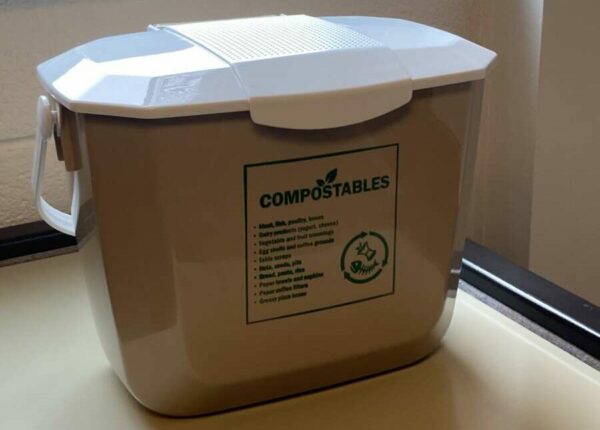
Since the initiative launched, he said, more than 100 cubic yards of finished compost has returned to Arlington for residents to pick up — similar to the county’s free mulch program. More will be available “in the next few weeks,” with details forthcoming on DES’s social media account.
The county’s curbside pickup is not an option for apartment dwellers, but officials encourage residents to discuss food scrap collection with their apartment or condo management.
For now, they can drop off their food scraps at the Trades Center in Shirlington, at local farmers markets and at the MOM’s Organic Market near Courthouse.
Based on current waste stream data, staff and a public advisory committee are working on a new, state-mandated Solid Waste Management Plan for the county, to be released in 2024, he said.
Get ready to “explore the world of recycling” next weekend at the family-friendly Rock-n-Recycle event in Shirlington.
The open house, put on by Arlington’s Department of Environmental Services (DES), is set for Saturday, Sept. 17 and will run from 9 a.m. to 2 p.m at the county’s Trade Center on S. Taylor Street.
The event will feature big trucks and machinery, many with “wrestler-like names such as the Rock Crusher, the Tub Grinder and the Food Composter” per DES spokesperson Peter Golkin.
Plus, there will be three dozen hands-on learning stations, take-home art activities, an ice cream truck, and “mountains of mulch.”
Saturday, Sept. 17: Rock-n-Recycle, the Solid Waste Bureau's family friendly open house. Come for the beards, stay for the big trucks and silos of sustainability. https://t.co/7ofbPuAeTG pic.twitter.com/4nJV0pL9hT
— Arlington Department of Environmental Services (@ArlingtonDES) September 6, 2022
“The purpose of this very family friendly open house by the Solid Waste Bureau is to provide a behind-the-scenes look at the world of recycling, composting, trash-to-energy, inert materials collection and other key environmental services provided by Arlington County,” Golkin told ARLnow.
No RSVP is required and the event is rain or shine. This will be the third time the county has put on the event, having done it previously in 2019 and 2021. DES expects at least “several hundred people” to attend.
The hope is that the open house “leaves a big, fun and lasting impression on kids and their adults too” while encouraging them to recycle, compost, and a better understanding of DES’s services.
From the county’s event listing: “See the big work machines (The Rock Crusher! The Tub Grinder!) up close, sit in the driver’s seat and meet the experts who keep Arlington clean and sustainable.”

We now know the likely culprit that killed nearly 100 fish in Four Mile Run last week: pool water.
“Investigators say flawed seasonal pool care involving chlorine and overflow led to last week’s fish kill in Four Mile Run,” Arlington Dept. of Environmental Services spokesman Peter Golkin tells ARLnow. “Recent rains have now cleared the stream. Reminder: No filters on our storm drains. Please be careful.”
Golkin said overflow from the pool at a “multi-family property swimming pool” — in other words, an apartment or condo complex — “got into the storm drain” and made its way to the stream, between S. Walter Reed Drive and S. Taylor Street.
Pool water, it turns out, is deadly.
“Swimming pool and spa water can have devastating effects on the health of our streams if not disposed of properly,” the county’s website says. “The chlorine, bromine, algaecides, cleaning chemicals and low oxygen levels can kill fish and other aquatic life in streams.”
“Only freshwater that is dechlorinated, pH neutral, chemical-free and clean may be slowly discharged into the storm drain system,” says the website. Otherwise, pool water must go into the sewer system.
Golkin noted that the county’s rules around swimming pool drainage are “especially timely as this is prime season for closing out pools for the year.”
It is illegal to drain untreated pool water directly or indirectly into storm drains, though it’s not clear whether anyone will face any fines or other consequences in this case.
“It was not a malicious act,” Golkin said. “It was a multi-family property swimming pool. The owners and their service people have been very cooperative with the investigation and in making follow-up improvements so such an incident isn’t repeated.”
Another pool-related drainage issue that comes up around this time each year: pool drainage that flows into neighboring properties, flooding yards, killing grass and sparking neighborhood disputes. The county considers such disputes to be out of its regulatory control.
More from the county website:
Chapter 26-7 makes it unlawful for any person to discharge directly or indirectly into the storm sewer system or state waters, any substance likely, in the opinion of the County Manager, to have an adverse effect on the storm sewer system or state waters. Failure to comply with code requirements may result in enforcement action, including the issuance of civil penalties as outlined in Chapter 26-10 of the Arlington County Code. Enforcement action may also be taken by state and federal authorities in the event of a fish kill. Please share this information with pool service companies. You may be held responsible for the results of their actions.
If pool or spa water is to be released over-land, the release should be:
- At least 10 feet from the property line
- Monitored and controlled to prevent flooding or erosion of neighboring properties
Conflicts between neighbors that arise due to the release of pool or spa water are considered civil in nature. The Property Drainage webpage contains further information about residential drainage concerns and the potential conflicts that can arise.
For more information on swimming pools and how to properly manage pool water discharge, call 703-228-4488.
Update: Investigators say flawed seasonal pool care involving chlorine and overflow led to last week's fish kill in Four Mile Run. Recent rains have now cleared the stream. Reminder: No filters on our storm drains. Please be careful. @ArlingtonVaFD https://t.co/1HhF74Y8HX
— Arlington Department of Environmental Services (@ArlingtonDES) September 12, 2022
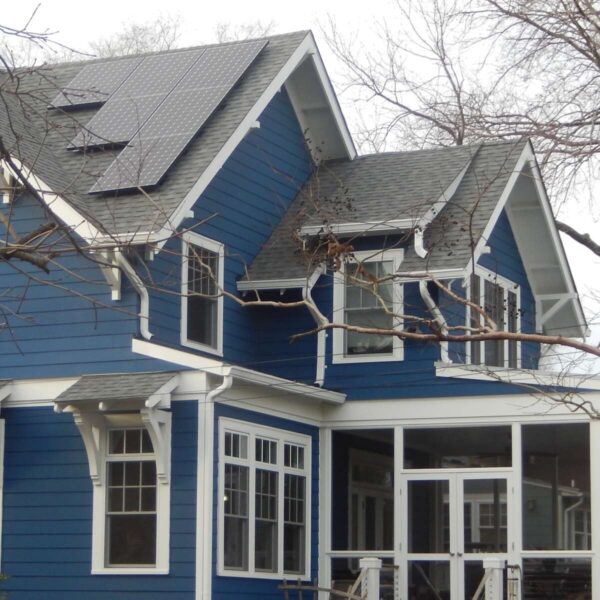
A county program has led to a large increase in solar panels being installed on homes over the last year.
The Arlington 2022 Solar and EV Charger Co-op is a seven-year-old partnership between the county and the non-profit Solar United Neighbors to purchase solar systems in bulk. The co-op, in turn, sells the systems to the customers at about a 20% discount, the program coordinator and a planner with the Arlington Initiative to Rethink Energy (AIRE) Helen Reinecke-Wilt explained to ARLnow.
The annual deadline to become a member is today (Aug. 31).
While the co-op is open to residents in Arlington, the City of Falls Church, and other surrounding Virginia localities, Arlingtonians comprise the majority of the membership.
And, since 2021, that has led to a substantial increase in solar panel systems being installed on Arlington homes.
Last year, 90 solar systems were installed in the county through the co-op. Add 17 from other localities, that’s 107 in total. That nearly doubled previous years’ numbers, Reinecke-Wilt said.
Last year’s record-breaking number will likely be exceeded in 2022 as well, the data suggests.
Reinecke-Wilt believes the reason for the uptick is that locals are looking to become more environmentally friendly as the county continues to tout its plan to be carbon neutral by 2050.
“I think it’s just a bigger awareness about climate action and the need to take action with more people thinking that they should be involved,” she said.
Locals are also recognizing the potential future savings due to being less dependent on the electrical grid. It’s estimated that households with solar panels save $600 to $1,100 a year on electrical costs, per the table on the co-op’s website.
While there are solar power systems being installed outside of the co-op, most installations in Arlington are through the co-op, we’re told. There are about 620 solar home systems in Arlington with 388 installed through the co-op, per data provided to ARLnow by the county’s Department of Environmental Services.
With nearly 120,000 residences in the county, that remains a small percentage. But the hope is that number will continue to increase due to the program’s growing popularity and the 30% tax credit now available thanks to the Inflation Reduction Act being signed earlier this month.
“The bump from 26% to 30% is [a big deal]. We are seeing a lot more members sign up in the past month and, certainly, I think it’s a reaction to that increase,” Reinecke-Wilt said.
There are reasons why most Arlington homes haven’t gone solar, including upfront costs — sometimes as much as $16,000 even with the tax credits. A roof’s lifespan is also a factor, with most vendors advising homeowners not to install solar panels on a roof older than seven years.
There’s also the still-vibrant (if slowly thinning) Arlington tree canopy, which shades many homes and can prevent sunshine from poking through to generate power. But that’s a good thing, Reinecke-Wilt said, since “it’s always better to have shade than solar because it provides natural cooling and helps the planet in other ways.”
Some residents also may not like the aesthetics of solar panels or hold the misguided belief that they bring down the value of the home.
But the sun seems to be rising on solar panels in Arlington.
At least by the metric of how many have signed up for the co-op, Arlington is outpacing nearly every other neighboring locality including those in D.C. and Maryland in terms of interest, Reinecke-Wilt said. She fully expects that more houses in Arlington will opt to go solar, prompted by the need to help with the climate crisis, federal incentives, and neighbor envy.
“I think it’s just getting to the point where people are starting to really notice it on a lot of homes and are asking their neighbors, ‘Why did you go solar? How did you do?'” said Reinecke-Wilt. “I think it will just continue to grow.”
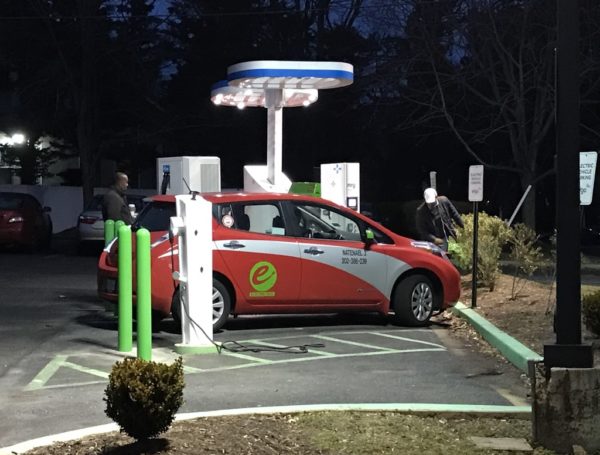
(Updated at 9:15 a.m. on 6/16/22) A new ordinance would mean no more free rides for users of county-owned electric vehicle charging stations.
A proposed interim fee of 14.52 cents per kilowatt-hour would reimburse the Arlington County for the cost of providing charging services, according to a report to the County Board, which will be taking up the item at its meeting this weekend. The new fee would go into effect on Monday, July 18, Department of Environmental Services spokesman Peter Golkin said.
Currently, there are seven available charging stations owned by the county, providing a total of 11 charging spaces for the public, at the Arlington Mill Community Center and the Long Bridge Aquatics Center.
If the proposal passes, the interim fee is set to remain in place while the county plans for expanding governmental electric vehicle charging stations.
Arlington’s Department of Environmental Services is hiring a consultant to come up with a “future recommendation on a permanent EV rate structure and charging model,” the board report says. The interim fee is set to serve as a pilot for the future plan.
The county has put signs up at the two charging stations it operates to inform users that the stations will no longer be free beginning in July, according to the report.
Although the proposed fee is higher than the current fee in neighboring Loudoun County, which charges per session, it is lower than other commercial stations. Those commercial stations charge between 22 cents per kilowatt-hour and 79 cents per kilowatt-hour, according to the board report.
Many charging stations operated by EVgo, the largest electric vehicle fast charging company in the U.S., charges around 36 cents per kWh.
The County Board is expected to vote this Saturday (June 18) to advertise the proposed change, before final approval at its Saturday, July 16, meeting.
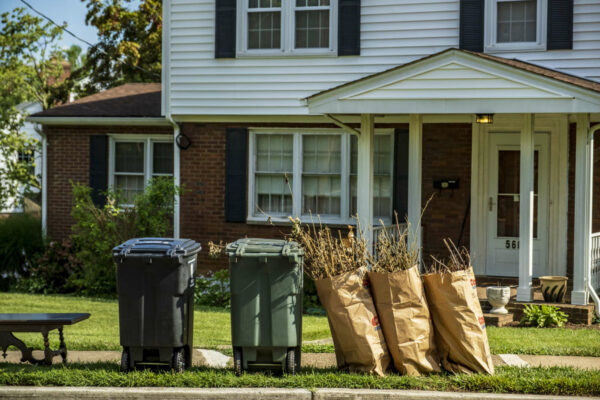
Arlington County is having more trash trouble.
Late last week, an email was sent to residents acknowledging that it’s been a “something of a challenge” in recent weeks for curbside pick-up of trash, recycling, and green organics. The note goes on to say that the job market, driver shortages, supply chain issues, and the “early record heat” are the main culprits.
“We’re now seeing a rising number of collection routes not being completed until the next day, particularly for green organics carts that are often the last serviced due to routing based on processing facility locations,” reads the email.
Like many jurisdictions, Arlington uses a contractor for trash pick-up. That contractor is American Disposal Services.
Peter Golkin, Arlington Dept. of Environmental Services (DES) spokesperson, tells ARLnow the problem started in April, coinciding with the annual increase in green-cart organics being put curbside for pick-up — as well as the start of warmer temperatures.
He couldn’t estimate when the issues might be resolved and says the issue is “largely beyond the control of Arlington County.” Golkin notes that such challenges are also being endured by other localities in the region. American Disposal Services is continuously looking to hire more employees, but it continues to be hard, he says.
“It’s hard to give an estimated time for improved conditions… The County’s contractor has raised wages several times in the past 18 months and pays well above the County mandated living wage of $17/hour,” Golkin wrote in an email. “It’s simply difficult right now — at any wage — to find people willing to work 10-hour days doing demanding physical labor outdoors in the region’s heat conditions.”
Overall, county crews service about 6,500 households a day that put out an average of three carts, said the email sent to residents. Meaning, there are about 20,000 carts that are in need of pick-up on a daily basis, which does not include bulk items or bags of yard debris and other organics.
“It’s demanding, exhausting work easily complicated by quickly arising factors like storms and equipment failures,” it reads.
The recent hot weather is also complicating the situation. More than $3,000 worth of sports drinks have been downed by crews recently, the county said, and supply chain issues are making it hard to find replacement parts when a truck breaks down.
“Until global supply chain issues begin to ease, we anticipate vehicle breakdowns will continue to hamper collection routes,” Golkin said.
Arlington has had other recent trash problems. Last month, residents complained of overflowing public trash bins in Pentagon City and Crystal City. That issue was mostly the result of increased seasonal tourism, the county said while pledging to fix the problem.
As for what residents can do to ease the trash collection backlog, the county is asking those impacted to remain patient, report missed trash service, be considerate about the number of items left curbside, and to remember that those working “aren’t in it for the glamor.”
The email also notes that Waste and Recycling Workers Week starts June 17.
“The people on the trucks can always use a friendly wave or even a note of thanks taped to a cart. They perform an absolutely essential service that is so easy to take for granted,” Golkin said. “Perhaps not anymore.”
Residents of an apartment complex off Columbia Pike were without water and air conditioning over Memorial Day weekend — and are still waiting on the AC to return.
The air conditioning and hot water stopped functioning on Friday at Dominion Towers Apartments, at 1201 S. Courthouse Road. On Sunday evening, water to the building was shut off completely, residents told ARLnow.
“The main water shut-off valve that is controlled by Arlington County has broken, which is why there’s no water to the building,” an email sent from owner Capital Investment Advisors to residents on Sunday read. “In order to resolve this issue, we will need Arlington County and a plumber. Considering it’s a holiday weekend, Maintenance is doing everything they can to contact emergency personnel to assist.”
Arlington’s Department of Environmental Services said management’s description of the issue was not exactly what happened, however.
The broken valve was inside the building’s boiler room and was not owned by the county, DES spokesman Peter Golkin said, but after the valve failed and the complex was unable to find a replacement during the holiday weekend the county offered one it had.
“The Water, Sewer, Streets Bureau actually had a replacement in its inventory and offered it up as a courtesy with the building agreeing to reimburse for a new valve,” Golkin told ARLnow. “The Bureau shut off the main to the building on Sunday to allow for the repair and restored that service from the public main yesterday.”
Running water was restored Monday evening but hot water and air conditioning were still not functioning as of Tuesday afternoon. An email from management said the AC has not been restored due to low water pressure.
“County staff was only involved in going above and beyond to help the residents of the apartment building get their water service back as soon as possible during a long, hot holiday weekend,” Golkin noted.
In an email to ARLnow on Monday, one resident said the property manager “has not been on site all weekend and there has been no timetable for when water and a/c will be restored.”
Another resident told us that management has told its tenants that it hopes to restore both the air conditioning and the hot water by the end of the day today.
To add a bit of extra drama to the situation, the fire department was called to the building earlier this afternoon for a report of a fire, though in the end they only found burnt food on a stove in an eighth floor apartment.
Dominion Towers previously made headlines in May 2018 after the air conditioning malfunctioned and left residents sweltering during a several day stretch of particularly hot weather.
Meanwhile, another large Arlington residential building suffered a multi-day utility outage last week.
Hundreds of residents in The Brittany condominium complex at 4500 S. Four Mile Run Drive found themselves in a similar situation heading into the weekend, without running water for 2+ days last week. For them, it was resolved by Friday afternoon.

